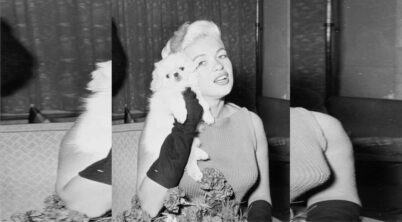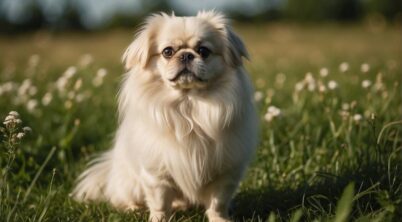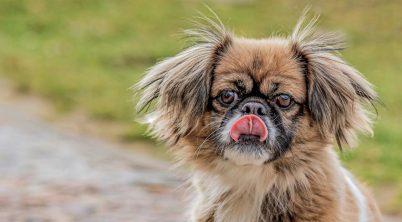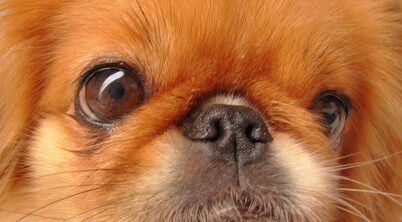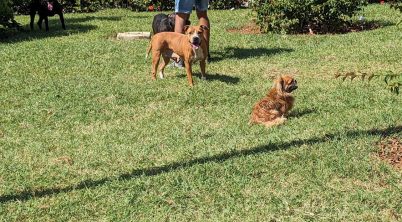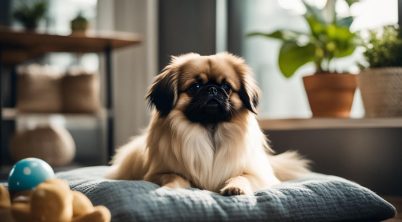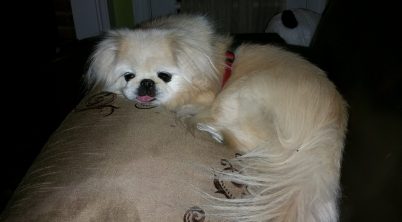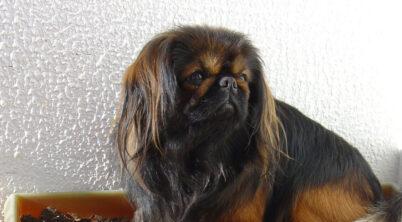Pekingese dogs are cherished for their distinctive, long, and luxuriant coats. However, hair loss can be a distressing issue for Pekingese owners. Understanding the potential causes is critical to address the problem effectively. Hair loss in these dogs can be a symptom of various underlying health conditions. It’s not uncommon for Pekingese to experience hair thinning or balding, and in some cases, this can be linked to genetic factors, nutritional deficiencies, or skin disorders.
Parasitic infestations are a common cause of hair loss in Pekingese. Mites, such as the Demodex mite, can lead to skin irritation and subsequent hair loss. Regular inspection of the Pekingese’s coat for signs of fleas, ticks, or mites is essential, especially after they’ve been outdoors. Prevention plays a significant role in managing these pests, with flea and tick repellents recommended by veterinarians serving as a first line of defense.
In addition to pests, poor grooming habits can contribute to hair loss in Pekingese. Their thick coats require diligent care, including daily brushing to prevent tangle formation and matting. Without proper grooming, the skin cannot breathe, potentially leading to hair loss. Moreover, residues from grooming products can build up if not thoroughly rinsed, causing skin irritation that can exacerbate hair shedding. Trimming around sensitive areas such as eyes, ears, and paws is also necessary to maintain hygiene and prevent discomfort that could lead to excessive scratching and hair loss.
Table of Contents
Pekingese Hair Loss
Pekingese dogs are well-known for their luxurious coats. However, they are prone to hair loss due to factors like health issues, nutritional deficiencies, and skin disorders. Maintaining the quality of their coat requires a combination of proper nutrition and care to address potential skin and coat disorders.
The Role of Nutrition in Coat Maintenance
Nutrition plays a pivotal role in maintaining a Pekingese’s coat. The breed has specific nutritional needs that, when met, can support a healthy undercoat and reduce shedding. Essential nutrients important for coat health include:
- Proteins: Building blocks for hair growth.
- Omega-3 and Omega-6 fatty acids: Enhance the shine and reduce skin inflammation.
- Vitamins: Such as Vitamin E, which promotes skin health.
- Minerals: Zinc and selenium are critical for hair follicle support.
A nutritionally balanced diet can mitigate hair loss by strengthening the hair follicles, thus retaining the undercoat and decreasing shedding.
Common Skin and Coat Disorders in Pekingese
Pekingese dogs may suffer from skin health issues that contribute to hair loss. These include:
- Allergic Dermatitis: Triggered by environmental allergens such as pollen, dust, or fleas. Symptoms are excessive scratching and hair loss.
- Hormonal Imbalances: Disruptions in the endocrine system can lead to thinning hair or bald patches.
- Parasitic Infections: Mites and fleas can cause intense irritation, leading to scratching and hair loss.
Regular veterinary check-ups, preventative treatments for parasites, and attention to any signs of skin irritation can help preserve the health of a Pekingese’s coat.
Proper Grooming Techniques
Proper grooming is crucial to maintaining a Pekingese’s healthy coat and preventing hair loss. Addressing mats and ensuring skin health through regular grooming practices are vital components of care for these dogs.
Brushing and De-Matting
Consistent brushing is key in the care of a Pekingese’s coat. Owners should engage in daily brushing to prevent the formation of mats which can pull on the skin and lead to hair loss. Using a high-quality bristle brush, owners should:
- Gently brush the dog’s coat in the direction of hair growth to smooth out the fur.
- Identify any mats and tackle them with a de-matting comb, working carefully to avoid pulling the skin.
Bathing and Skin Care
Bathing is another essential aspect of a Pekingese’s grooming routine. One should:
- Bathe their Pekingese approximately every three to four weeks using a mild shampoo formulated for dogs.
- Ensure the dog’s skin is thoroughly rinsed to prevent irritation or dryness, which can contribute to hair loss.
Incorporating these grooming techniques will support the health and appearance of a Pekingese’s coat and can help in minimizing hair loss issues.
Diet and Nutritional Support
A Pekingese’s coat health reflects its internal well-being. Diet and nutritional support play a critical role in maintaining healthy skin and preventing hair loss. Adequate nutrition ensures the delivery of essential vitamins, minerals, and fatty acids, which can fortify skin health and reduce hair shedding in these dogs.
Essential Fatty Acids and Skin Health
Omega-3 and Omega-6 fatty acids are vital for a Pekingese’s skin health and coat condition. These fatty acids help in:
- Reducing inflammation: They can alleviate skin irritation and inflammation that may contribute to hair loss.
- Supporting skin barrier function: Omega fatty acids strengthen the skin barrier, which is crucial for retaining moisture and protecting against environmental stressors.
A balanced diet should include a source of these fatty acids, such as fish oil supplements or flaxseed oil, to support the Pekingese’s skin and coat.
Eliminating Dietary Allergens
Food allergies can lead to skin problems and hair loss in Pekingese dogs. Identification and elimination of allergens from the diet is a critical step. Signs of food allergies include:
- Chronic itching
- Skin rashes
- Gastrointestinal issues
To determine food sensitivities or allergies, one may need to work with a veterinarian and conduct an elimination diet, gradually removing potential allergens and monitoring the Pekingese’s response. Common dietary allergens for dogs include beef, dairy, wheat, egg, chicken, lamb, soy, pork, rabbit, and fish.
Preventing and Treating Hair Loss
Efficient management of Pekingese hair loss requires a strategic approach, targeting both prevention and treatment. Caregivers should consider a pet’s environment, health status, and grooming regimen to mitigate the risk of hair loss.
Identifying and Addressing Allergies
Allergies are a significant factor in Pekingese hair loss. They should be thoroughly evaluated to prevent and reduce symptoms. Hair loss in Pekingese due to allergies can stem from various sources such as fleas, mites, environmental allergens, or food sensitivities. Identifying the specific allergen is crucial.
- Allergy Testing: Veterinarians typically recommend allergy testing to pinpoint the exact cause of dermatitis.
- Environmental Modifications: Reducing exposure to allergens may involve changes to the Pekingese’s environment. This could include using hypoallergenic bedding and regular cleaning.
- Flea and Mite Control: Consistent use of flea and mite preventatives is essential in allergic Pekingese.
In cases of contact dermatitis, it’s imperative to remove or avoid the allergen. Medicated shampoos can help alleviate skin irritation.
Medical Interventions for Hair Loss
When dealing with Pekingese hair loss, several medical interventions can be helpful, especially if the underlying cause is related to hormonal imbalances or other systemic issues.
- Hormonal Treatment: Hair loss associated with hormonal imbalances may be treated with drugs that regulate hormone levels.
- Medicated Products: Medicated shampoos and topical treatments prescribed by a veterinarian can treat hair loss caused by infections or infestations.
- Antibiotics: If bacterial skin infections are present, veterinarians may prescribe antibiotics.
In conjunction with treatments, it’s important to remember that a proper grooming routine using gentle products can also support a healthy coat. Regular vet check-ups can ensure that any new or ongoing issues with hair loss are addressed promptly.
Health and Behavior Factors Affecting Coat
In managing Pekingese coat health, one must consider the influences of stress and the importance of exercise on the dog’s overall wellbeing, as both significantly impact the dog’s skin and hair condition. Factors ranging from health issues like skin infections to behavioral changes due to stress can manifest as poor coat quality.
Recognizing Symptoms of Stress and Anxiety
A Pekingese displaying excessive itching or inflammation may be exhibiting signs of stress or anxiety. These symptoms should not be dismissed as benign discomfort, as they can lead to further skin irritation or infection. It is important for owners to observe their Pekingese for signs of behavioral change, such as a decrease in playfulness or an increase in lethargy, which can indicate an underlying issue affecting their coat’s health.
- Signs of stress in Pekingese:
- Changes in behavior (e.g., increased barking or chewing)
- Disruption in normal sleeping patterns
- Avoidance of social interaction
Impact of Physical Exercise on Coat Health
Regular exercise is crucial for maintaining a healthy Pekingese coat. It stimulates blood flow, which in turn promotes a healthy skin and coat. Lack of physical activity can lead to a dull coat and may exacerbate conditions that provoke hair loss, such as allergies or parasitic infestations. Furthermore, exercise can also help to manage stress, reducing the likelihood of anxiety-related coat issues.
- Benefits of regular exercise:
- Improved circulation leading to healthier skin
- Reduction in stress-related behaviors
- Prevention of health problems due to obesity, which can affect coat quality
By incorporating ample opportunity for physical activity into a Pekingese’s routine, owners can play a proactive role in sustaining coat health and minimizing the risks of exercise-related skin and coat problems.

